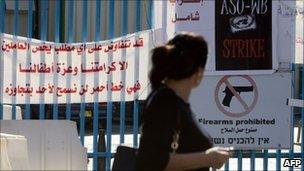UN pay strike closes Palestinian schools in West Bank
- Published

A strike by UN workers in the West Bank has entered its second month, forcing Palestinian children out of school and leaving rubbish piling on the streets.
Local staff of the UN Relief and Works Agency (UNRWA) are demanding strike pay - for this strike and an earlier one.
The agency runs camps and schools for Palestinian refugees in the West Bank.
After protests in several UN camps this week, Palestinian Prime Minister Salam Fayyad has stepped in to try to broker a deal between trade unions and the UN.
Major disruption
About 50,000 primary school children who get a UN education in the Israeli-occupied territory have not been able to attend classes for more than a month.
On the streets of Ramallah, there has been a noticeable increase in young children using their spare time to sell small goods such as CDs or bottled water.
In UN camps across the West Bank, residents have complained of rubbish not being collected.
About 4,000 Palestinian UN staff are striking. The UN says about 1,000 have refused to go on strike.
Catch 22
The current action dates back to an incident earlier this year when staff went on strike for a week in protest against disciplinary action taken against a teacher at a UN school in the West Bank.
Workers are now striking, demanding that they get paid for that original week as well as for the current month of strike action.
In a somewhat Catch 22 situation, the longer the strike continues, on the bigger their grievance gets and the more workers want to be paid.
If UNRWA backs down and agrees to pay workers for all the days they have been on strike, it would cost the agency millions of dollars.
This could be embarrassing for an organisation that receives most of its money through donations from countries such as Britain and the United States - currently facing tough economic times themselves.
In October, the UK Department for International Development announced £8m ($13m) in funding for UNRWA.
A spokesman for UNRWA said it was looking at a number of solutions, including getting staff to work extra days in the future as a way of being paid for days lost through strike action.
- Published19 July 2010
- Published26 December 2009